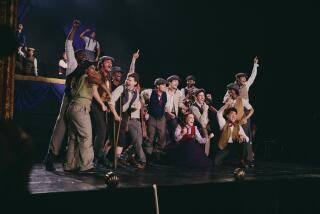Bomb-Proof Walls Hide All-Star Ballot Counter : Five Huge Reading Machines Work Around Clock to Tally Fan’s Balloting
- Share via
TEANECK, N.J. — As many as 45 people work in the constant blare of rock ‘n’ roll music, counting ballots in a complex that serves such corporate giants as ITT, Olivetti and the Royal Bank of Canada.
Five IBM reading machines, each the size of a kitchen stove, clack away, sometimes 24 hours a day, behind bomb-proof walls and bullet-proof windows, counting the punches in up to 1,200 cards per minute.
Everyone who enters or leaves the building goes through a security check. Guards are posted throughout the building, all day, every day, as the counting machines feed results into a bank of computers that can handle up to 20 million instructions per second.
And all this for baseball’s fan balloting for the annual All-Star Game.
“Of course, we also process about $60 billion worth of financial information through here each year,” says Gerald S. Ghertler, vice president and general manager of Fidata Computing Services.
Fidata, headquartered in this suburban town about 10 miles west of New York City, was selected to do the tabulating four years ago by Gillette, which sponsors the All-Star balloting. In 1984 alone, it counted 6,333,903 ballots.
Most of the workers who feed the machines are college students on summer break. Fidata employs as many as 45 during peak counting weeks leading up to the All-Star Game, which is July 16 this year in Minneapolis.
“The hours are flexible and how long they work is based on when we get the deliveries of ballots,” says Frank Carr, Fidata’s project manager. “We like to stay ahead--whatever we receive, we process right away. One guy was here for 36 hours straight last year. He slept here.
“They get real dedicated. Most of them are college kids. They play this music all the time, and they really get into the work. It’s work they can relate to. We’ve always had good crews that go the distance with us.”
Ballots left at all U.S. ballparks are sent to Fidata via courier service. Ballots left at retail outlets and minor league parks are mailed in. Last year, the Toronto Blue Jays flew their ballots in on a private plane rather than mail them, while the Expos drove them down from Montreal, Carr says.
The ballots all arrive in boxes marked by their place of origin. After they are counted, the ballots are put back into their original cartons and stored until the sponsor says they can be sent away for recycling, usually in September. Folded or mutilated cards and cards indicating that a write-in candidate was chosen are counted by hand in a special room.
“So far, we’ve been able to handle the volume pretty effectively,” Carr says. “Each year, it’s become more of a science. It’s rare that anything goes wrong, and when it does, it’s usually minor.”
A quality control punch in the corner of each card insures that they can’t be counterfeited. “Anybody would be hard-pressed to duplicate the card,” Carr says, “and it’s probably not worth doing.”
Outside of Carr, only the baseball commissioner’s office and the sponsor’s office in Boston have computer access to the ongoing tabulation of votes.
“Maybe only two people at Gillette know the vote count,” Ghertler says.
Periodic official reports of the vote count are sent from Fidata to the commissioner’s office via a third-party courier.
Computers are the central part of Fidata’s operation. Results of balloting are stored on computer disks that can handle 327 million characters of information each, and the company is installing machines that will triple that capacity.
“Once it’s in the computer, it takes no time at all,” says Bruno Roccoberton, Fidata’s operations manager, “not even a millisecond to get from the CPU (computer processing unit) to a disk.”
The computer room rests on a raised floor. Under the floor and on the ceiling, censors monitor temperature and guard against fire. Any fire would be extinguished by breathable halon gas pumped in through ventilation ducts. One room is taken up by a mechanical contrivance called an Exide panel, which guards against fluctuations in electrical current, and the whole system is backed up by batteries and a generator the size of a hay wagon with a 5,000-gallon fuel tank.
While baseball’s All-Star balloting may merit such exotic handling, Ghertler reminds again of the huge volume of financial transactions made through his company.
“We’re audited every year by the Federal Reserve Bank, the Securities Exchange Commission, our own auditing firm and each customer’s own auditor,” Ghertler says.
” . . . We keep everything as closely guarded as possible.”
More to Read
Go beyond the scoreboard
Get the latest on L.A.'s teams in the daily Sports Report newsletter.
You may occasionally receive promotional content from the Los Angeles Times.










